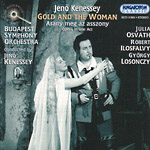Gold and the Woman, written in 1943, is the sole opera of Hungarian composer Jeno Kenessey (1905-76). The story, which takes place in Upper Hungary during the 15th century, tells of Wolfgang, a wealthy old burgher who discovers his wife Anna’s plan to run off with Rotarides, a young mercenary captain for whom Wolfgang is obliged to provide lodging in his own home (Rotarides’ king is in debt to Wolfgang). Before the lovers can make their getaway, Wolfgang tempts Rotarides with coins he has made by melting gold in his oven. To Anna’s dismay, Rotarides’ desire for gold proves stronger than his love for her, and he accepts the coins. Wolfgang, who secretly placed the king’s guards in waiting, has him arrested for counterfeiting, a crime punishable by death. Anna despairs as Wolfgang lectures on the duty of burghers to defend their homes.
Kenessey fleshes out this scenario in an imaginative and colorful score ranging in style from romanticism to the folk-derived modernism of Kodály (with hints of Bartók as well, especially in the mysterious Bluebeard’s Castle-like opening). Kenessey does not restrict his influences to his homeland however, as you can hear traces of French impressionism in the occasionally exotic melodic lines. There’s even a bit of Puccini-style Italian versimo that heightens the drama at key points, such as in Rotarides’ and Anna’s passionate love duet, and especially Rotarides’ seduction scene, where Anna (sung with riveting emotional intensity by Julia Osváth) desperately pleads with him to return to their love.
Tenor Róbert Ilosfalvy’s full, resonant singing vividly brings to life the arrogant, passion-filled Rotarides, while György Losonczy’s stentorian baritone immediately makes it clear who’s king of the castle. The composer leads the Hungarian State Opera Chorus and the Budapest Symphony in this wonderfully vital performance. The mono recording projects the voices clearly (though the louder ones occasionally overload) and keeps them in satisfying balance with the orchestra. Twentieth century opera fans have found themselves a real gem of a one-acter, and aficionados of Hungarian music and language should snap this up as well.
































